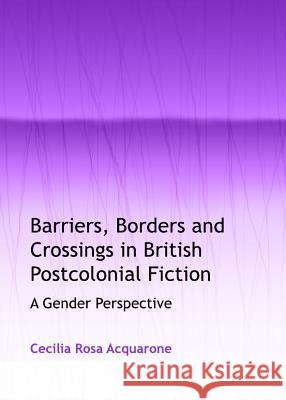Barriers, Borders and Crossings in British Postcolonial Fiction: A Gender Perspective » książka
Barriers, Borders and Crossings in British Postcolonial Fiction: A Gender Perspective
ISBN-13: 9781443846707 / Angielski / Twarda / 2013 / 245 str.
"Dr. Cecilia Acquarone's perceptive analysis of liminality in British postcolonial fiction from a gender perspective constitutes an innovative, thought-provoking and crystal-clear study of female 'versus' male responses to the challenges of postmodernity as exemplified by significant British postcolonial writers. The book can be justly praised for the lucid use of theoretical language and the exploration of modern and postmodern ideology in an unobstrusive form, pinpointing the most significant phenomena related to the topic in question. Dr. Acquarone locates the relevance of barriers, borders and crossings with gender on the agenda within the realm of tragedy and comedy, providing a sensible and sensitive humanistic approach to the works of some of the most outstanding authors of British postcolonial fiction. In sum, Cecilia Acquarone's book is undoubtedly an invaluable contribution to the field of British postcolonial studies." -- Dr. Antonio Ballesteros-Gonzalez, Spanish Open University. Cecilia Acquarone's "Barriers, Borders and Crossing in British Postcolonial Fiction: A Gender Perspective is a particularly interesting contribution to the field of postcolonial criticism due to its perceptive intertwining of a sound theoretical background and a sensitive close reading of representative novels by major writers of contemporary multicultural Britain. In a clear prose, she sheds light on highly complex philosophical and sociological issues, expounding on what the feminine and the masculine perspective can contribute to the hard task of peaceful coexistence in contemporary British multicultural society." -- Angeles de la Concha, Catedratica de Filologia Inglesa, Universidad Nacional de Educacion a Distancia. "Barriers, Borders and Crossing in British Postcolonial Fiction: A Gender Perspective provides an original attempt to map an increasingly visible body of writing in the UK in recent years. In her analysis of key novels by black and Asian British writers, the author highlights an opposition between the predominantly tragic vision of life of the male authors and the fundamentally comic vision of life found in the women writers. The author offers a provocative reading of recent black and Asian British fiction as postmodernist works in which the writers respond differently to contemporary conditions. The volume is a significant contribution to the field of postcolonial studies and diaspora studies, and its use of the comedy-tragedy paradigm to understand recent fiction enriches more common approaches to the two major ways of experiencing and discussing diaspora. -- Dr. Sofia Munoz-Valdivieso, Associate Professor, University of Malaga











